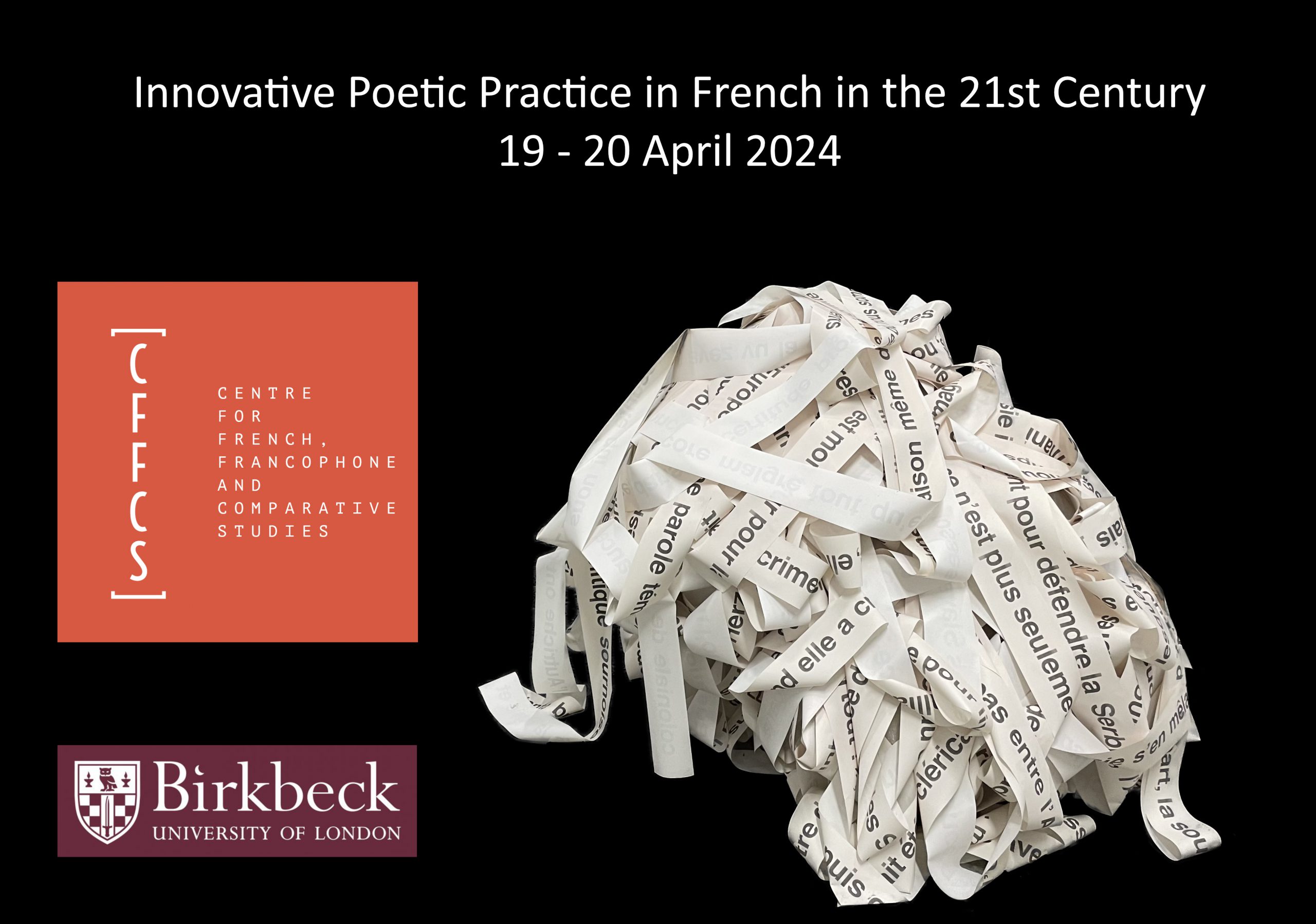INTERNATIONAL CONFERENCE
(English version below)
Anne-James Chaton artwork. Original photograph by Seth Tisue on Flickr. Background removed for conference poster.
Les pratiques poétiques novatrices de langue française au 21ème siècle
19-20 avril 2024
Centre for French, Francophone and Comparative Studies (CFFCS)
Birkbeck, Université de Londres, Royaume-Uni
Conférenciers invités confirmés :
Jeff Barda (Université de Manchester, Royaume Uni)
Justine Huppe (Université de Liège, Belgique)
Emma Wagstaff (Université de Birmingham, Royaume Uni)
Programme Colloque 2024
Réserver une place / Book your place
La publication dans le milieu des années 1990 de la Revue de Littérature Générale par Olivier Cadiot et Pierre Alferi, dont l’essai introductif, « La mécanique lyrique », peut se concevoir comme une forme de manifeste, marque un tournant symbolique dans le paysage poétique français. Depuis plus d’un quart de siècle, des pratiques poétiques s’en inspirent partiellement avant de prendre leur envol vers une multitude de directions inouïes. Certains les décrivent comme expérimentales, d’autres comme radicales, et d’autres encore comme innovatrices ; les tentatives de définition sont discutées, et le consensus reste à venir.
Le terme de « post-poésie », inventé par Jean-Marie Gleize, théoricien et poète innovateur lui-même, dès les années 1980, prête à interprétation. S’agit-il d’une poésie peu reconnaissable comme telle, ayant abandonné les définitions d’antan et se prêtant à un jeu de synergies avec d’autres formes d’art ? Ou bien est-ce autre chose, n’ayant plus rien à voir avec la poésie (« pour un certain nombre des écrivains qui produisent ces objets, la référence à la poésie n’est plus nécessaire », Gleize, Sorties, p. 42) ?
D’autre part et par-delà les influences de Gleize, Cadiot et Alferi, comment les pratiques poétiques de langue française se caractérisent-elle aujourd’hui ? Qui sont les nouveaux poètes innovateurs, les nouveaux théoriciens ? Que se passe-t-il en France et hors de France ?
Parmi les auteurs qui pourraient être considérés, on compte : Pierre Alferi, Rim Battal, Mustapha Benfodil, Olivier Cadiot, Anne-James Chaton, Jean-Michel Espitallier, Alain Farah, Christophe Fiat, Jérôme Game, Jean-Marie Gleize, Christophe Hanna, Lisette Lombé, Vannina Maestri, Charles Pennequin, Anne Portugal, Nathalie Quintane, Jacques Sivan.
Cette liste est loin d’être exhaustive, et les propositions sur d’autres poètes contemporains seront les bienvenues.
Les propositions de communication (300 mots maximum, en français ou en anglais, accompagnées d’une notice bio-bibliographique de 100 mots maximum) sont à adresser avant le 1er novembre 2023 à Nathalie Wourm, directrice du CFFCS (n.wourm@bbk.ac.uk).
Le colloque aura lieu en personne à Birkbeck, au cœur de Bloomsbury, à Londres, et se tiendra en français et en anglais.
____________________________________________________
Innovative Poetic Practice in French in the 21st Century
19-20 April 2024
Centre for French, Francophone and Comparative Studies (CFFCS)
Birkbeck, University of London, UK
Confirmed guest-speakers:
Jeff Barda (University of Manchester, UK)
Justine Huppe (University of Liège, Belgium)
Emma Wagstaff (University of Birmingham, UK)
Published in the mid-1990s by Olivier Cadiot and Pierre Alferi, the Revue de Littérature Générale – whose introductory essay, « La mécanique lyrique », can be regarded as a form of manifesto – represents a symbolical turning point in the French poetic landscape. For over a quarter of a century, poetic practitioners have been partly inspired by it, before taking flight in a multitude of unexpected directions. Some describe this poetry as experimental, others as radical or as innovative; attempts to define it are the subject of discussions, and a consensus is yet to come.
The notion of “post-poésie” – invented by theorist and innovative poet Jean-Marie Gleize – remains to be elucidated. Is it a type of poetry that is not easily identifiable as such, having abandoned past definitions, and lending itself to a game of synergies with other art forms? Or is it something else, which no longer has anything in common with poetry (« pour un certain nombre des écrivains qui produisent ces objets, la référence à la poésie n’est plus nécessaire », Gleize, Sorties, p. 42) ?
Moreover, and beyond the influences of Gleize, Cadiot and Alferi, what do French-language poetic practices look like today? Who are the new innovative poets, the new theorists? What is happening in France and outside France?
Writers that could be discussed include : Pierre Alferi, Rim Battal, Mustapha Benfodil, Olivier Cadiot, Anne-James Chaton, Jean-Michel Espitallier, Alain Farah, Christophe Fiat, Jérôme Game, Jean-Marie Gleize, Christophe Hanna, Lisette Lombé, Vannina Maestri, Charles Pennequin, Anne Portugal, Nathalie Quintane, Jacques Sivan.
This list is far from complete and abstracts on other contemporary poets are welcome.
Abstracts of no more than 300 words (in French or in English), and a bio-bibliography of no more than 100 words should be sent before 1 November 2023 to Nathalie Wourm, director of the CFFCS (n.wourm@bbk.ac.uk).
The conference will take place in person at Birkbeck, in the heart of Bloomsbury, in London, and will be held in French and English.
